64 Cores of Rendering Madness: The AMD Threadripper Pro 3995WX Review
by Dr. Ian Cutress on February 9, 2021 9:00 AM EST- Posted in
- CPUs
- AMD
- Lenovo
- ThinkStation
- Threadripper Pro
- WRX80
- 3995WX
CPU Tests: Encoding
One of the interesting elements on modern processors is encoding performance. This covers two main areas: encryption/decryption for secure data transfer, and video transcoding from one video format to another.
In the encrypt/decrypt scenario, how data is transferred and by what mechanism is pertinent to on-the-fly encryption of sensitive data - a process by which more modern devices are leaning to for software security.
Video transcoding as a tool to adjust the quality, file size and resolution of a video file has boomed in recent years, such as providing the optimum video for devices before consumption, or for game streamers who are wanting to upload the output from their video camera in real-time. As we move into live 3D video, this task will only get more strenuous, and it turns out that the performance of certain algorithms is a function of the input/output of the content.
HandBrake 1.32: Link
Video transcoding (both encode and decode) is a hot topic in performance metrics as more and more content is being created. First consideration is the standard in which the video is encoded, which can be lossless or lossy, trade performance for file-size, trade quality for file-size, or all of the above can increase encoding rates to help accelerate decoding rates. Alongside Google's favorite codecs, VP9 and AV1, there are others that are prominent: H264, the older codec, is practically everywhere and is designed to be optimized for 1080p video, and HEVC (or H.265) that is aimed to provide the same quality as H264 but at a lower file-size (or better quality for the same size). HEVC is important as 4K is streamed over the air, meaning less bits need to be transferred for the same quality content. There are other codecs coming to market designed for specific use cases all the time.
Handbrake is a favored tool for transcoding, with the later versions using copious amounts of newer APIs to take advantage of co-processors, like GPUs. It is available on Windows via an interface or can be accessed through the command-line, with the latter making our testing easier, with a redirection operator for the console output.
We take the compiled version of this 16-minute YouTube video about Russian CPUs at 1080p30 h264 and convert into three different files: (1) 480p30 ‘Discord’, (2) 720p30 ‘YouTube’, and (3) 4K60 HEVC.
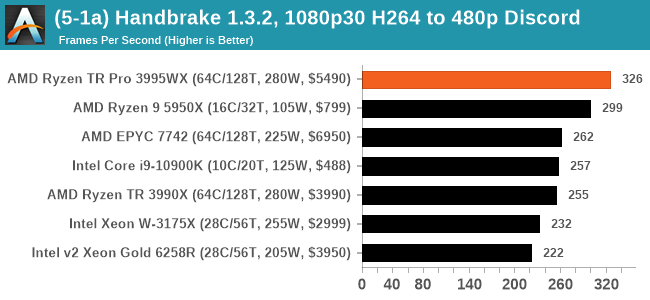
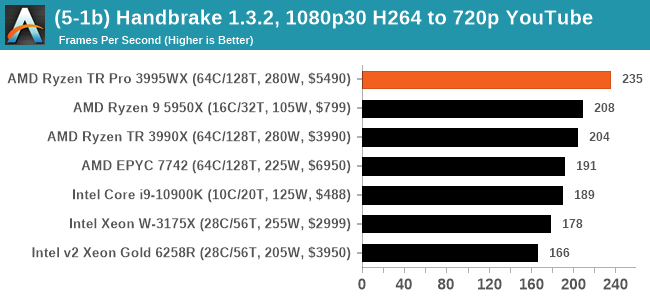
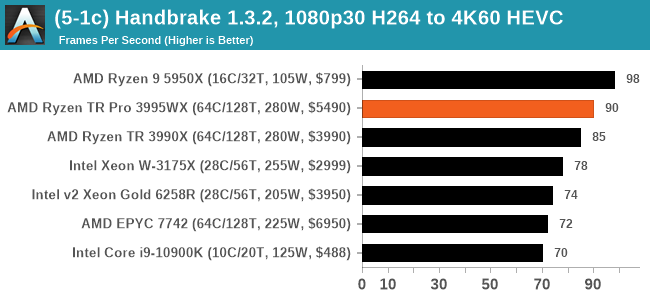
For the lower resolution modes, it would appear that the increased memory bandwidth plays a role for the 3995WX and 7742, although single core frequency also means a lot. Moving to the HEVC metrics, the Ryzen 9 takes a win here, but the 3995WX still goes above the 3990X.
7-Zip 1900: Link
The first compression benchmark tool we use is the open-source 7-zip, which typically offers good scaling across multiple cores. 7-zip is the compression tool most cited by readers as one they would rather see benchmarks on, and the program includes a built-in benchmark tool for both compression and decompression.
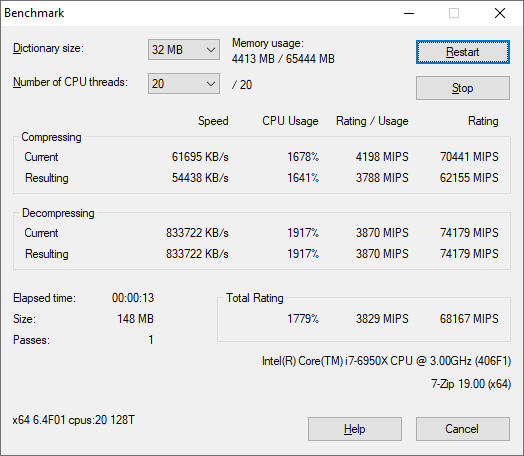
Example Test Run on an Intel 10-core i7-6950X
The tool can either be run from inside the software or through the command line. We take the latter route as it is easier to automate, obtain results, and put through our process. The command line flags available offer an option for repeated runs, and the output provides the average automatically through the console. We direct this output into a text file and regex the required values for compression, decompression, and a combined score.
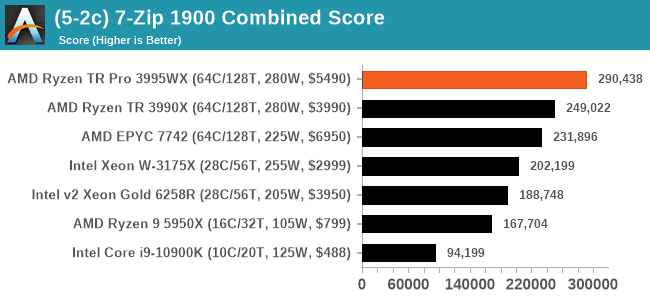
This is a 16.6% win for the TR Pro 3995WX.
AES Encoding
Algorithms using AES coding have spread far and wide as a ubiquitous tool for encryption. Again, this is another CPU limited test, and modern CPUs have special AES pathways to accelerate their performance. We often see scaling in both frequency and cores with this benchmark. We use the latest version of TrueCrypt and run its benchmark mode over 1GB of in-DRAM data. Results shown are the GB/s average of encryption and decryption.
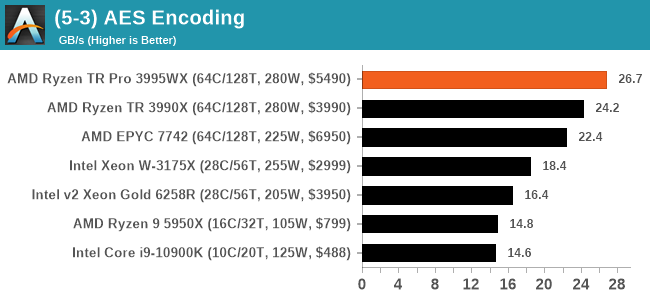
WinRAR 5.90: Link
For the 2020 test suite, we move to the latest version of WinRAR in our compression test. WinRAR in some quarters is more user friendly that 7-Zip, hence its inclusion. Rather than use a benchmark mode as we did with 7-Zip, here we take a set of files representative of a generic stack
- 33 video files , each 30 seconds, in 1.37 GB,
- 2834 smaller website files in 370 folders in 150 MB,
- 100 Beat Saber music tracks and input files, for 451 MB
This is a mixture of compressible and incompressible formats. The results shown are the time taken to encode the file. Due to DRAM caching, we run the test for 20 minutes times and take the average of the last five runs when the benchmark is in a steady state.
For automation, we use AHK’s internal timing tools from initiating the workload until the window closes signifying the end. This means the results are contained within AHK, with an average of the last 5 results being easy enough to calculate.
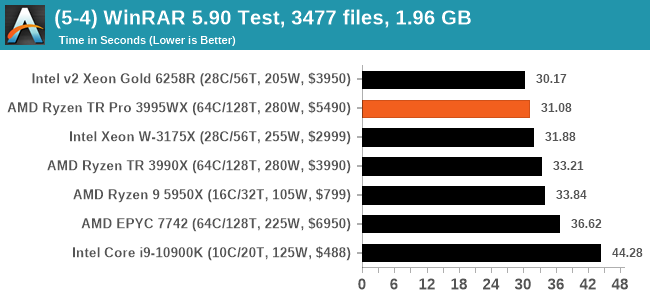
WinRAR is variable threaded, but the Xeon Gold takes the win here - even compared to the Xeon W-3175X. It's all relatively close at the top end.


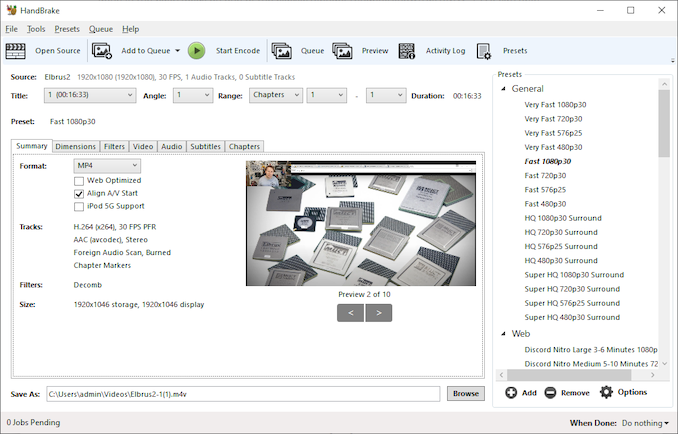
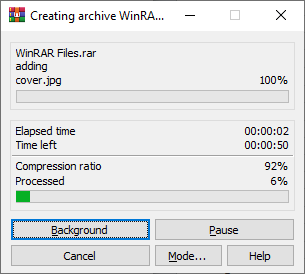








118 Comments
View All Comments
YB1064 - Tuesday, February 9, 2021 - link
You are kidding, right? Intel has become the poor man's AMD in terms of performance.kgardas - Wednesday, February 10, 2021 - link
From general computing point of view yes, but from specific point no. Look at 3d particle movement! 3175x with less than half cores, at least $1k cheaper is able to provide more than 2x perf of the best AMD. So if you have something hand optimized for avx512, then old, outdated intel is still able to kicks amd ass and quite with a style.Spunjji - Wednesday, February 10, 2021 - link
@kgardas - Sure, but not many people can just throw their code at one of only a handful of programmers in the world with that level of knowledge and get optimised code back. That particle movement test isn't an industry-standard thing - it's Ian's personal project, hand-tuned by an ex-Intel engineer. Actual tests using AVX512 aren't quite so impressive because they only ever use it for a fraction of their code.Fulljack - Thursday, February 11, 2021 - link
not to mention that any processor that run in avx512 will have it's clockspeed tanked. unless your program maximize the use of avx512, the net progress will result slower application than using avx/2 or none at all.sirky004 - Tuesday, February 9, 2021 - link
what's you deal with AVX 512?Usual workload with that in mind is better to offload in GPU.
There's a reason why Linus Torvald hate that "power virus"
kgardas - Wednesday, February 10, 2021 - link
Usually if you write the code, it's more easier to add few avx512 intrinsic calls then to rewrite the software for GPU offload. But yes, GPU will be faster *if* the perf is not killed by PCIe latency. E.g. you need to interact with data on CPU and perform just few calcs on GPU so moving data cpu -> gpu -> cpu -> loop over, will kill perf.kgardas - Wednesday, February 10, 2021 - link
AFAIK, Linus hates that avx512 is not available everywhere in x86 world. But this will be the same case with upcoming AMX, so there is nothing intel may do about it. Not sure if AMD will need to pay some money for avx512/amx license or not...Qasar - Wednesday, February 10, 2021 - link
sorry kgardas but linus HATES avx512:https://www.extremetech.com/computing/312673-linus...
https://www.phoronix.com/scan.php?page=news_item&a...
"I hope AVX512 dies a painful death, and that Intel starts fixing real problems instead of trying to create magic instructions to then create benchmarks that they can look good on… "
where you got that he likes it. and chances are, unless intel makes amx available with no issues, amx maybe the same niche as avx 512 is.
kgardas - Wednesday, February 10, 2021 - link
Yes, I know he hates the stuff, but not sure about the right reason. In fact I think AVX512 is best AVX so far ever. I've read some of his rants and it was more about avx512 is not everywhere like avx2 etc. etc. Also Linus was very vocal about his departure from Intel workstation to AMD and since AMD does not provide avx512 yet it may well be just pure engineering laziness -- don't bother me with this stuff, it does not run here. :-)Qasar - Wednesday, February 10, 2021 - link
i dont think it has to be do with laziness, it has to do with the overall hit you get in performance when you use it, not to mention the power usage, and the die space it needs. from what i have seen, it still seems to be a niche, and over all not worth it. it looks like amd could add avx512 to zen at some point, but maybe, amd has decided it isnt worth it ?